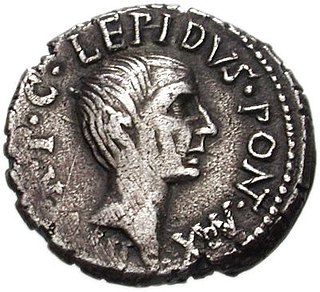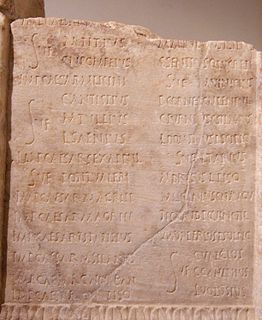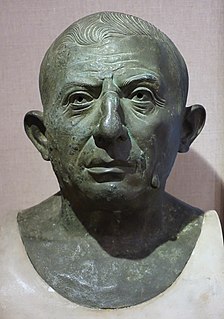This article concerns the period 79 BC – 70 BC.

Year 77 BC was a year of the pre-Julian Roman calendar. At the time it was known as the Year of the Consulship of Brutus and Lepidus. Later and less frequently, it was known as the year 677 AUC). The denomination 77 BC for this year has been used since the early medieval period, when the Anno Domini calendar era became the prevalent method in Europe for naming years.

Marcus Aemilius Lepidus was a Roman general and statesman who formed the Second Triumvirate alongside Octavian and Mark Antony during the final years of the Roman Republic. Lepidus had previously been a close ally of Julius Caesar. He was also the last Pontifex Maximus before the Roman Empire.

The gens Fabia was one of the most ancient patrician families at Rome. The gens played a prominent part in history soon after the establishment of the Republic, and three brothers were invested with seven successive consulships, from 485 to 479 BC, thereby cementing the high repute of the family. Overall, the Fabii received 45 consulships during the Republic. The house derived its greatest lustre from the patriotic courage and tragic fate of the 306 Fabii in the Battle of the Cremera, 477 BC. But the Fabii were not distinguished as warriors alone; several members of the gens were also important in the history of Roman literature and the arts.

The gens Aemilia, originally written Aimilia, was one of the greatest patrician families at Rome. The gens was of great antiquity, and claimed descent from Numa Pompilius, the second King of Rome. Its members held the highest offices of the state, from the early decades of the Republic to imperial times. The Aemilii were almost certainly one of the gentes maiores, the most important of the patrician families. Their name was associated with two major roads, an administrative region of Italy, and the Basilica Aemilia at Rome.
The gens Fulvia, originally Foulvia, was one of the most illustrious plebeian families at Rome. By the end of the fourth century BC, they had joined the nobiles through the patronage of the Fabii, who supported the successful candidacy of Lucius Fulvius Curvus for the consulship of 322 BC. They were long active in the politics of the Republic, and gained a reputation for producing excellent military leaders.
Marcus Lollius perhaps with the cognomen Paulinus was a Roman politician, military officer and supporter of the first Roman emperor Augustus.
Lucius Aemilius Barbula, or Lucius Aemilius Q.f. Q.n. Barbula, was a Roman politician and general from the patrician gens Aemilia. He was elected consul for 281 BC and was given a command against the Samnites. He invaded the territory of Tarentum, which summoned Pyrrhus of Epirus for help. In 280, he was awarded a triumph for his victories in Tarentum, Samnium, and elsewhere.
Manius Aemilius Lepidus was a Roman politician who became consul in 66 BC alongside Lucius Volcatius Tullus.
Quintus Aemilius Papus, a member of the gens Aemilia - an ancient ruling class — of the Papus family, was a Roman general and statesman.
Quintus Lutatius Catulus, sometimes called "Capitolinus" for his defence of the capital in 77 BC, was a politician in the late Roman Republic. His father was the like-named Quintus Lutatius Catulus, consul in 102 BC.
Quintus Marcius Philippus was a Roman consul in 281 BC.

The gens Caecilia was a plebeian family at Rome. Members of this gens are mentioned in history as early as the fifth century BC, but the first of the Caecilii who obtained the consulship was Lucius Caecilius Metellus Denter, in 284 BC. The Caecilii Metelli were one of the most powerful families of the late Republic, from the decades before the First Punic War down to the time of Augustus.
Quintus Aemilius Barbula, or Q. Aemilius Q. f. L. n. Barbula, was consul in 317 BC, in which year a treaty was made with the Apulian Teates, Nerulum was taken by Barbula, and Apulia entirely subdued. Barbula was consul again in 311, and had the conduct of the war against the Etruscans, with whom he fought an indecisive battle according to Livy. The Fasti, however, assign him a triumph over the Etruscans, but Niebuhr thinks this to have been an invention of the family, more especially as the next campaign against the Etruscans was not opened as if the Romans had been previously conquerors.
Quintus Aemilius Lepidus was a Roman senator and military officer who was appointed consul in 21 BC as the colleague of Lucius Arruntius the Elder.
Marcus Aemilius Barbula was a Roman politician from the gens Aemilia. He was a consul in 230 BC alongside Marcus Junius Pera, succeeding Marcus Pomponius Matho and Gaius Papirius Maso and preceding Lucius Postumius Albinus and Gnaeus Fulvius Centumalus. He was son of Lucius Aemilius Barbula and grandson of Quintus Aemilius Barbula, also consuls, and the third and last of the lineage in this charge.

The gens Sosia, occasionally written Sossia, was a plebeian family at ancient Rome. Members of this gens occur in history from the end of the Republic down to the third century AD. The first of the Sosii to attain the consulship was Gaius Sosius in 32 BC, and the family would continue holding various positions in the Roman state until the third century.
The gens Hortensia was an ancient plebeian family in Rome. Members of this gens are first mentioned in the fifth century BC, but from that time somewhat infrequently until the final century of the Republic. The most illustrious of the gens was the orator Quintus Hortensius, a man of great learning, and a contemporary of Cicero. Under the Empire they seem to have sunk back into obscurity.





